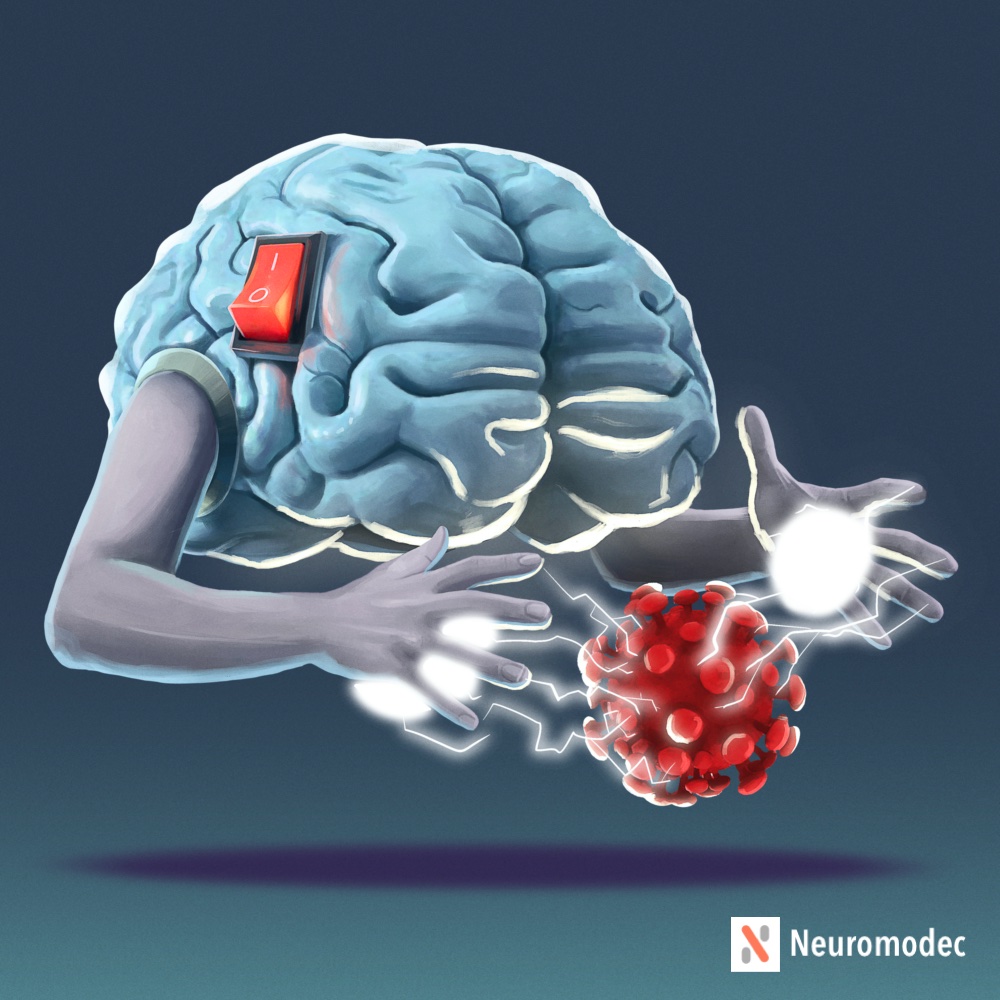
1. A pilot trial in Belgium reports taVNS, as tested, not effective on biological markers for Long-Covid
- In “Transcutaneous Auricular Vagus Nerve Stimulation (tVNS) can Reverse the Manifestations of the Long-COVID Syndrome: A Pilot Study” published in Advances in Neurology and Neuroscience Research on May 21, 2021 the authors report “we decided to test tVNS (transcutaneous Vagal Nerve Stimulation) on the syndrome because this procedure could reduce inflammatory processes, 20 patients suffering from chronic COVID syndrome were selected. We did not observe a modification of the blood inflammatory circulating factors, invalidating the hypothesis of an effect of tVNS on a remaining inflammatory state”. Despite not finding positive results the authors remain optimistic “We suggest that tVNS improves chronic COVID syndrome through a “sympathetic reset”. Alternative approaches / devices for taVNS make have different efficacy. (see for example).
2. Scientific American describes “COVID Long Haulers Are Calling Attention to Chronic Illnesses But society is not prepared for the growing crisis of long COVID” on March 1, 2022. Including “Yet long COVID was rarely discussed in public health messaging during the Delta and Omicron waves; officials focused on acute severe disease and death and largely ignored the debilitating—and life-altering—long-term effects that the virus has on so many people. We’ve had even fewer conversations about the societal responsibilities we have toward a growing generation of sick people, many of whom are between the ages of 30 and 50.”
3. The prestigious Science highlights an articles showing “COVID-19 patients face higher risk of brain fog and depression, even 1 year after infection Giant study of U.S. veterans shows lingering mental health effects from SARS-CoV-2 infection” on Feb 16, 2022 “Dozens of papers have examined the lingering mental health effects of COVID-19, but many have measured conditions such as depression and brain fog only a few months after infection. Now, a giant new study shows people who contracted COVID-19 faced substantially higher risks of neuropsychiatric ailments 1 year later, including brain fog, depression, and substance use disorders. The report, based on millions of people who used the U.S. Department of Veterans Affairs (VA) health system early in the pandemic, is published today in The BMJ.”
4. Several new trials on brain stimulation for COVID are launching including “Cognitive Training and Brain Stimulation in Patients With Post-COVID19 Cognitive Impairment” at University Medicine Greifswald, Germany and “Home-based Brain Stimulation Treatment for Post-acute Sequelae of COVID-19 (PASC)” at Massachusetts General Hospital, Massachusetts, United States. For a complete list of neuromodulation trials for COVID see the Neuromodec’s listing.
5. New conference: 2022 Joint meeting of Neuroergonomics Conference & NYC Neuromodulation Conference announced for Jul 28-August 1, 2022. The conference will include special sessions on neuromodulation for COVID. Details and Registration here
6. Dolphin Neurostim reports it received Health Canada approval for non-invasive auricular vagus nerve stimulation. Product page The company claims its system can be used for “1) Acute: COVID-19 Respiratory. Dolphin Vagal Nerve Stimulator is authorized for emergency use in the acute treatment of COVID-19 ARDS 2) Prevention: Immunity Enhance. Front line workers need extra immunity protection that enhanced Vagal Tone offers. 3) Long-Haul COVID recovery. COVID-19 Long Haulers suffer from stress-related disorders long after acute symptoms go away. Activating Vagal tone can reverse many symptoms.” In reporting claims made by companies, Neuromodec is explicit when those claims are made by the company and makes no endorsements. The Health Canada listing “Authorized medical devices for uses related to COVID-19: List of medical devices for expanded use” can be found here and indicates “Instructions for Use for Dolphin Neurostim (NS) applied as a vagal nerve stimulator (VNS) is authorized for emergency use in the acute treatment of adult patients with known or suspected COVID-19. Intended for those: who are experiencing exacerbation of asthma-related dyspnea and reduced airflow and for whom approved drug therapies are not tolerated or provide insufficient symptom relief as assessed by their health care provider. Using non-invasive VNS applied to the auricular branch of the vagus nerve (ABVN) during the COVID-19 pandemic can help with symptom relief. There are no safety or effectiveness issues with regards to the expanded use.”
7. A study evaluating “Evaluate the safety and efficacy of transcutaneous vagus nerve stimulation in preventing respiratory failure and improving survival in hospitalized COVID-19 patients.” was published on July 29, 2021 in the Journal of Emerging Diseases and Virology. This was a 51 subject open label open-label, and observational trial to assess the transcutaneous vagus nerve stimulation (tVNS) in hospitalized SARS-CoV-2 infected subjects. Eligible subjects are 18 years old or older, requiring hospitalization for COVID-19 pneumonia. The trial used the Nemechek Technologies device. The authors concude “The use of tVNS resulted in a low rate of adverse events, infrequent mechanical ventilation, and a high rate of survival.”